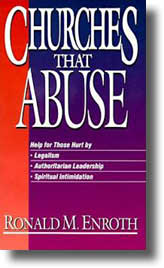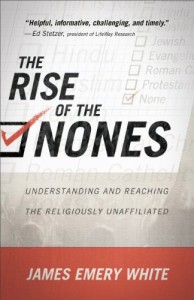Kerby Anderson provides an overview of what makes churches and organizations spiritually and emotionally unhealthy and hurtful.
In some ways, this article on spiritual abuse is an update on a previous article on Abusive Churches. However, this article also provides a biblical perspective on the broader issue of spiritual abuse occurring in our country today.

Many church leaders became aware of the prevalence of abusive churches more than four decades ago when Professor Ronald Enroth wrote his best-selling book, Churches That Abuse. A few years later he followed up with a book on Recovering from Churches that Abuse.
More than three decades ago, Dr. Pat Zukeran wrote a week of Probe radio programs based on the first book by Ronald Enroth. The transcript of that program is still one of the top ten most popular articles based on the number of Internet searches that land on them each year.
That response to this important subject isn’t unique. For example, thousands have also purchased the book by Stephen Arterburn Toxic Faith. The same is true of Ken Blue’s book Spiritual Abuse and Philip Keller’s book Predators in Our Pulpits. June Hunt with Hope for the Heart has also written a helpful booklet on Spiritual Abuse.
Jesus addressed the issue of spiritual abuse many times when he confronted the Pharisees. In Matthew 23, he proclaims seven woes to the Scribes and Pharisees. He concludes with: “You serpents, you brood of vipers, how are you to escape being sentenced to hell?” He describes them this way in John 8:44, “You are of your father the devil, and your will is to do your father’s desires.”
Paul also addresses various aspects of spiritual abuse and legalism within the church. He warns us about legalism by teaching that no works of the law can justify us (Romans 3:20). Instead, the “law of the Spirit of life has set you free in Christ Jesus from the law of sin and death” (Romans 8:2).
Spiritual abuse can occur when someone is in a position of spiritual authority misuses that authority to control or manipulate another Christian. It may take the form of using religious works to control. It may involve misusing Scripture or twisting biblical concepts. Churches or Christian organizations may be guilty of teaching false doctrine. Even churches that teach sound doctrine may be guilty allowing worship leaders to bring music into the church with bad theology.
Spiritual abuse can also occur when someone in a position of spiritual authority fails to act. Many of the recent church scandals took place because church leaders or denominational leaders failed to act on or report incidents of sexual harassment or sexual abuse.
Characteristics of Abusive Churches
The book, Churches That Abuse, lists eight characteristics of abusive churches. You might compare that list to your own church and to other churches you know.
1. Abusive churches have a control-oriented style of leadership. The leader may be arrogant and dogmatic. The leader often is portrayed as more in tune spiritually with God. Thus, these leaders often are not accountable to anyone.
2. Second, the leader of an abusive church often uses manipulation to gain complete submission from their members. These tactics may involve guilt, peer pressure, and intimidation. The leader may even suggest that divine judgment from God will result if you question them.
3. There is a rigid, legalistic lifestyle involving numerous requirements and minute details for daily life. Members are pressured to give a certain amount of time and money to the church. Often members drop out of school, quit working, or neglect their families to meet a church-designated quota.
4. Abusive churches tend to change their names, especially once they are exposed by the media. Often this is done because the church received bad publicity or was involved in a significant scandal.
5. Abusive churches are often denouncing other churches because they see themselves as superior to all other churches. The church leadership sees itself as the spiritual elite and the “faithful remnant.” They are the only ones “faithful to the true gospel.”
6. Abusive churches have a persecution complex and view themselves as being persecuted by the world, the media, and other Christian churches. Because they see themselves as a spiritual elite, they also expect persecution from the world and even feed on it.
7. Abusive churches specifically target young adults between eighteen and twenty-five years of age. Often, they target youth who are less experienced but looking for a cause. Sometimes an abusive church becomes surrogate parents to these young adults.
8. Members of abusive churches have a great difficulty leaving and often involves social, psychological, or emotional pain. Church members are often afraid to leave because of intimidation and social pressure. If they leave, they may be stalked and harassed by members of the abusive church.
Leaving an Abusive Church
For many of the reasons previously discussed, it is difficult for members to leave an abusive church. There is significant emotional and spiritual damage that results. Often, former members of an abusive church not only leave the church, but they leave God.
The emotional damage is significant. One author suggested that victims of church abuse or other forms of spiritual abuse suffer PTSD(post-traumatic stress disorder). They find it difficult to trust others, whether leaders in a church or other leaders in their life.
Victims of abusive churches also find it difficult to find the right church. That is why Ronald Enroth in his second book and Ken Blue in his book talk about discerning good from abusive. Here are a few questions worth considering.
1. Does the church leadership invite dialogue and solicit advice from others in the church who are not part of the elite group of leaders? Dogmatic and authoritarian pastors are threatened by diverse opinions whether from members or from people outside the church.
2. Is there a system of accountability or is all the power located in one person? Dogmatic and authoritarian pastors are not accountable to anyone. They may have a board of elders who merely “rubber stamp” any decisions.
3. Does the church encourage independent thinking and encourage members to develop discernment? Abusive church leaders attempt to get all its members to conform. There is a very low tolerance (sometimes no tolerance) for alternative perspectives even about insignificant programs and minor policies about how to run the church.
4. Is family commitment strengthened? Many churches (not just abusive churches) often demand so much of members that they begin to neglect their families. If parents are made to feel guilty for going to their children’s school events when it might conflict with a routine church meeting or activity, something is wrong.
5. Is the individual church member growing spiritually or on the edge of burnout? If you have to constantly attend a myriad of church meetings and meet a quota (time, talent, treasure) in order to be given church approval, something is wrong.
When someone leaves an abusive situation, it becomes difficult to trust others. That is also true when leaving an abusive church. Going to a different church or study group can be difficult and even frightening. But these questions help in choosing a church or organization that will help you grow spiritually.
Enabling Behavior and a Biblical Response – Part 1
There are no perfect churches because there are no perfect people. Sometimes I will hear someone say they are looking for the perfect church. A good response I have heard is: “If you find the perfect church, don’t join it because you will ruin it. You aren’t perfect.”
Every church has its problems, and pastors have a sin nature. But it does seem that we are also guilty of enabling behavior inside the church that isn’t healthy. Here are just a few statements I have gleaned from various sources.
Christians today often enable spiritual abuse from leaders because we value charisma over character. A pastor or leader is often given a platform not because of character but because he is a dynamic preacher.
Jesus warned His disciples (Matthew 20:25-28) that leaders should not exercise authority over people. Instead, whoever wants to become great must lower himself to be a servant. Paul even warns (2 Timothy 4:3) there will be a time when followers “will not endure sound doctrine.” Instead, they will want “to have their ears tickled” by eloquent speakers, who may not even have sound doctrine.
Paul reminds Timothy (1 Timothy 3:2-3) that a leader in the church should be “must be above reproach . . . sober-minded, self-controlled, respectable, hospitable, able to teach, not a drunkard, not violent but gentle, not quarrelsome, not a lover of money.”
Peter (1 Peter 5:2-3) instructs the church that leadership should “shepherd the flock of God that is among you, exercising oversight, not under compulsion, but willingly, as God would have you; not for shameful gain, but eagerly; not domineering over those in your charge, but being examples to the flock.”
Christians today also enable spiritual abuse when they value the institution over individuals. We have seen this in our numerous radio
programs involving church sexual abuse. Churches and denominations have been too quick to cover up sexual abuse scandals and intimidate victims. Time and
again we hear them worrying about their reputations or the reputation of the church or denomination.
Christians today enable spiritual abuse when they value division over unity. Pastors and Christian leaders who are denouncing other churches or denominations can make us feel good about our church and denomination. But it doesn’t bring unity. Paul teaches in Ephesians 4:3-6 to “Make every effort to keep the unity of the Spirit through the bond of peace. There is one body and one Spirit, just as you were called to one hope when you were called; one Lord, one faith, one baptism; one God and Father of all, who is over all and through all and in all.”
Enabling Behavior and a Biblical Response – Part 2
Christians today enable spiritual abuse when they value performance over character. Churches are often quicker to remove a pastor teaching heresy than to remove a pastor with character deficits. We should address heresy. Peter warns (2 Peter 2:1) that there will be “false prophets among the people, just as there will be false teachers among you. They will secretly introduce destructive heresies, even denying the sovereign Lord who bought them, bringing swift destruction on themselves.”
But some churches or denominations may have pastors or church leaders who have good theology but poor character. One example in the New Testament can be found in a man named Diotrephes (3 John 9-12). John plans to confront him because he is self-willed (likes to put himself first) and rebellious (does not acknowledge authority) and a slanderer (talking wicked gossip). Some commentators have called him the first “church boss” because he uses power for ungodly ends within the church.
But notice that John says nothing about him having bad theology. In his previous letters (1 John and 2 John), he does call out the unbiblical teaching of the false teachers. The problem with Diotrephes was not theology but psychology. For all we know, he might have been a good Bible teacher, but his behavior is the problem. How many churches have turned a blind eye to character problems with a pastor because he was a good preacher and brought people into the church?
Christians today enable spiritual abuse when they value anger and outrage over grace and meekness. Too often we reward candidates who raise their voice and point their fingers by electing them to office. We may enjoy a pastor who pounds the pulpit and condemns society, but is that what is required of a church leader?
Christians should not be enabling this behavior, they should be confronting this behavior and even condemning this behavior. This first step should be to follow the instructions of Jesus (Matthew 18:15-17) to go directly to a person engaging in spiritual abuse (after prayer and reflection). If he listens to you, “you have won your brother over. But if he will not listen, take one or two others along.” If this is happening in society, we should speak out against spiritual abuse and abusive churches.
An important response to spiritual abuse is biblical truth. As believers we should proclaim the truth. Truth means freedom, not bondage. Jesus said, “You shall know the truth and the truth shall make you free” (John 8:32).
Additional Resources
Stephen Arterburn, Toxic Faith, Nashville, Tenn.: Oliver Nelson Publishing, 1991.
Ken Blue, Healing Spiritual Abuse, Downers Grove, Ill.: InterVarsity Press, 1993.
Ronald Enroth, Churches that Abuse, Grand Rapids, Mich.: Zondervan Publishing, 1992.
Ronald Enroth, Recovering from Churches that Abuse, Grand Rapids, Mich.: Zondervan Publishing, 1994.
June Hunt, Spiritual Abuse: Religion at Its Worst, Dallas: Hope for the Heart, 2015.
©2024 Probe Ministries

 In his book Churches That Abuse, Dr. Ronald Enroth carefully examines several of these churches throughout the United States. He reveals the cultic methods these groups use and points out several distinguishing marks of abusive churches. At this point I will briefly introduce each of these characteristics and some of my own. Later, I’ll discuss all these characteristics in detail.
In his book Churches That Abuse, Dr. Ronald Enroth carefully examines several of these churches throughout the United States. He reveals the cultic methods these groups use and points out several distinguishing marks of abusive churches. At this point I will briefly introduce each of these characteristics and some of my own. Later, I’ll discuss all these characteristics in detail.

